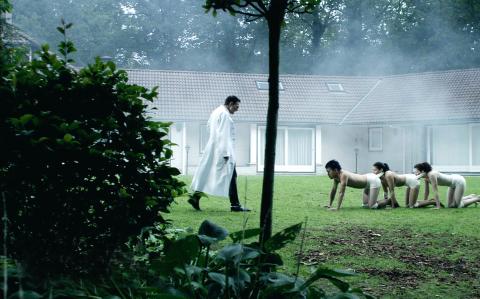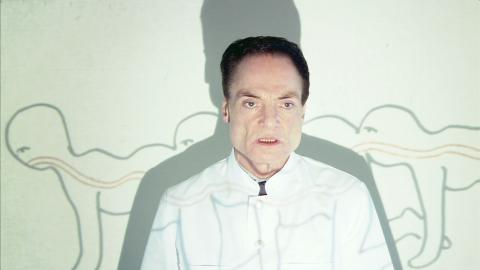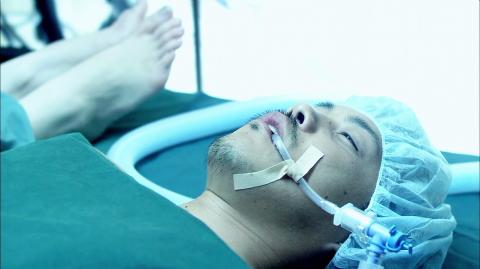The release of a sequel is rarely unalloyed good news in the film world. This rule has once again been demonstrated by The Human Centipede II (Full Sequence), a horror film by the Dutch director Tom Six, which was due to be released in the UK on DVD but refused a certificate by the British Board of Film Classification (BBFC) — not trimmed, not cut, but every single horrible minute banned outright. This now brings the number of films completely banned by the BBFC in its 98-year history to 11, of which only three are still legally unavailable in the UK. The ban has startled many, with some even suggesting that in the country’s new Conservative era, banning and censorship have become politically fashionable once more.
In the first film, a sadistic surgeon kidnaps and drugs three young people and, detaching their entrails on the operating table, uses these to connect the mouth of one to the anus of the other, and forces them to shuffle around together on their hands and knees in his remote, heavily guarded house, a fully functioning, interorganic triple-bodied human pet. I thought that this film, passed uncut with an 18 certificate, was macabre and horrible but admittedly ingenious, a genuine vision of hell, genuinely horrifying in a way most “horror” films are not, and actually less explicit than many in its violence.
This sequel is about someone becoming obsessed with a DVD copy of the original film, recreating a “centipede” like the one shown, and raping the woman at the end in grotesquely sadistic and cruel ways. The BBFC refused to allow it, and maintained that the movie may actually go beyond their purview, being an infringement of the Obscene Publications Act, and liable to cause real “harm” to the public. The director has responded furiously: “My dear people it is a fucking MOVIE. It is all fictional. Not real. It is all make-belief [sic]. It is art. Give people their own choice to watch it or not.”

Photo Courtesy of IFILM
This week, I telephoned the movie’s UK distributors Eureka Entertainment and asked if I could come in to their north London offices to watch The Human Centipede II on DVD to judge for myself. After all, the BBFC’s report of the film’s contents is as subjective as anyone else’s and, having committed themselves to a ban they could be said to have an interest in, or subconscious bias toward exaggerating its vileness. After some discussion, Eureka called back and turned me down, but said that Six and his associates are now consulting lawyers with a view to taking their case to the BBFC’s “Video Appeals Committee.” This body, which includes novelist Fay Weldon and the former BBC Blue Peter (a children’s program) editor Biddy Baxter, could in theory reverse the ban.
The whole nature and tone concerning what was once known as the “censorship” debate has now achieved a kind of un-seriousness. People are exhausted by the circularity of the argument. How can you decide whether or not something is fit to be seen, without seeing it? Ladies and gentlemen of the jury, ladies and gentlemen of the Video Appeals Committee, Ms Weldon, Ms Baxter, you have seen this film — have you been depraved?
Whatever happens, nobody, but nobody, believes that The Human Centipede II will be effectively suppressed. It has been certificated in Australia, and highly likely to pass in the US, so those who want it will do what everyone did when A Clockwork Orange was banned in the UK: order an “import” Region 1 DVD online.

Photo Courtesy of IFILM
Even those who think the BBFC ban will give the film the oxygen of publicity don’t think it will be that much publicity, because no one cares that much. The conservative papers that once campaigned against filth nowadays save their fire for winnable battles against potty-mouthed BBC presenters. Like everyone else, they are uneasily aware that for decades now, sensationally controversial films and books have evaded bans, and civilization as we know it remains eerily in place. Censorship is not taken seriously. The last time I saw it being discussed with any solemnity was by Sacha Baron-Cohen’s creation Ali G, interviewing the BBFC’s former chief, the now late James Ferman, and frowning with dismay at the amount of pornography he has to watch in one sitting: “But ... no one can keep it hard for that long.”
The tone for the Human Centipede discussion was set by the exuberant debate on Twitter this week, which speculated about what Human Centipede III and Human Centipede IV would look like, and what the title might be for a full-scale Hollywood remake. Blogger Dan Brusca brilliantly suggested: Human Centipede: The Fellowship Of The Ring.
Absurdity is the inevitable by-product of trimming and cutting and banning. When The King’s Speech had its swearwords censored for its American release, the film’s British fans were variously amused and appalled by the philistinism and bone-headedness of this approach. And yet there will always be someone who thinks that any cut is bone-headed, and there will also be those who think that looking absurd is the price to be paid for maintaining values. Looking absurd is, for censors, perhaps, a 21st century “white-man’s burden,” an obligation not to mind being ridiculed by liberals.

Photo Courtesy of IFILM
When I heard about The Human Centipede II, in all its reported loathsomeness, my thought was: Can it really be more shocking than so many of the films I have already seen? Is it more shocking than Michael Winterbottom’s The Killer Inside Me, in which a woman submits humbly, even joyfully, to being beaten to death by her lover in stomach-turningly explicit detail? Or how about Takashi Miike’s Ichi The Killer, with all its psychotic murders and slashings? Or how about Roland Joffe’s torture-porn movie Captivity? Or Gaspar Noe’s legendary shocker, Irreversible, with its unbearable rape scene? Or how about Rob Zombie’s nausea-festival The Devil’s Rejects? And many, many, many more.
I can hardly credit it. But a decision from the BBFC commands attention from me, because it has become an open, grown-up, transparent institution, and the common sense on show from its officers make it a very good advertisement for self-regulation. It’s certainly superior to the equivalent US body, the Motion Picture Association of America, a highly reactionary, secretive and high-handed institution, which does not discuss its work, which comes down like a ton of bricks on sex but is far more lenient with violence, and always has two clergymen on its own appeals board: one Catholic, one Episcopalian, with no other religions allowed.
Movie writers such as Jonathan Rosenbaum, the former critic of the Chicago Reader, argue that in any case the debate about censorship and suppression is wrong-headed: Filth-and-the-fury cases concerning controversial movies are a distraction. Big corporate behemoths and multiplex chains ensure that we are fed a diet of pap, and interesting and demanding independent movies are difficult, and nigh-on impossible to see, especially for people who live outside a big capital city. This is the true suppression.

Photo Courtesy of IFILM
Yet the row over The Human Centipede II presents a problem for all who believe that the BBFC should, in theory, reserve the right to exercise a ban in some unimaginably extreme case. How to respond when some specific film gets banned? We all know that bans, like superinjunctions, are remarkably ineffective. People will get hold of The Human Centipede II. But then child porn and guns are banned, and people get hold of them too — does that make the ban meaningless? Middle-aged liberal that I am, I am sometimes uneasy about the usual way explicit movies are laughed off by old hands as “exploitation” flicks: They are exploitative, and that sort of makes it all right.
Well, in the final analysis, I have to say that it is very difficult, in fact impossible, for me to avoid returning to the approach I personally have always had with regard to censorship: don’t. I would say to Baxter, Weldon and everyone else on the committee: Give The Human Centipede II an 18 Certificate so it can only be watched by people over 18 years of age, and let adults make up their own minds. Let it vanish into the commercial oblivion that almost certainly awaits.
Or, if the appeals committee can’t agree on this, then a second thought occurs: Why not give it a Restricted-18 or R-18 certificate, which means that the DVD can be shown only in licensed sex shops and not via mail order? The BBFC does give out R-18 certificates. In 2004, it was, somewhat startlingly, given to a theatrically released film-compilation called The Good Old Naughty Days, a selection of hardcore silent pornography from the French belle epoque: People who wanted to view this quaint material had to do so in a licensed cinema, and had to “join” this cinema, in person, days before turning up to see the film.
Well, in answer to this question, the BBFC rejects the idea. A R-18 certificate is not appropriate in this case, because it is intended for hardcore porn intended to arouse sexually, and not a horror film, which is how this film is billed. But what would happen if the appeals committee — formally entrusted with judgment as it is — ruled that the Human Centipede II, in its loathsome way, was in fact committed to precisely these sexual and pornographic objectives, and that therefore the R-18 certificate was the way to go? A lively debate would ensue, and the BBFC might well refuse to accept the Video Appeals Committee’s decision. But I’m not sure that it isn’t a workable option, or at least no more absurd than anything else.
Anyway, what the BBFC currently doing is stoking the flames of curiosity and making a series of Human Centipede films, a Human Centipede franchise, more likely in the years ahead. And that might indeed be an affront to public decency.

In the March 9 edition of the Taipei Times a piece by Ninon Godefroy ran with the headine “The quiet, gentle rhythm of Taiwan.” It started with the line “Taiwan is a small, humble place. There is no Eiffel Tower, no pyramids — no singular attraction that draws the world’s attention.” I laughed out loud at that. This was out of no disrespect for the author or the piece, which made some interesting analogies and good points about how both Din Tai Fung’s and Taiwan Semiconductor Manufacturing Co’s (TSMC, 台積電) meticulous attention to detail and quality are not quite up to

April 28 to May 4 During the Japanese colonial era, a city’s “first” high school typically served Japanese students, while Taiwanese attended the “second” high school. Only in Taichung was this reversed. That’s because when Taichung First High School opened its doors on May 1, 1915 to serve Taiwanese students who were previously barred from secondary education, it was the only high school in town. Former principal Hideo Azukisawa threatened to quit when the government in 1922 attempted to transfer the “first” designation to a new local high school for Japanese students, leading to this unusual situation. Prior to the Taichung First

Chinese Nationalist Party (KMT) Chairman Eric Chu (朱立倫) hatched a bold plan to charge forward and seize the initiative when he held a protest in front of the Taipei City Prosecutors’ Office. Though risky, because illegal, its success would help tackle at least six problems facing both himself and the KMT. What he did not see coming was Taipei Mayor Chiang Wan-an (將萬安) tripping him up out of the gate. In spite of Chu being the most consequential and successful KMT chairman since the early 2010s — arguably saving the party from financial ruin and restoring its electoral viability —

The Ministry of Education last month proposed a nationwide ban on mobile devices in schools, aiming to curb concerns over student phone addiction. Under the revised regulation, which will take effect in August, teachers and schools will be required to collect mobile devices — including phones, laptops and wearables devices — for safekeeping during school hours, unless they are being used for educational purposes. For Chang Fong-ching (張鳳琴), the ban will have a positive impact. “It’s a good move,” says the professor in the department of